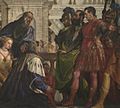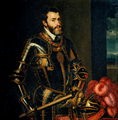The Prince facts for kids
The Prince is a book written by Niccolò Machiavelli, who lived in the city of Florence in the country of Italy. The book was published in 1513.
The book talks about politics and government. During his life, Machiavelli saw many changes in the government of Florence. He thought a lot about what a king or prince should do to make a strong government. In the book, he said the ruler had to get a lot of power.
One of the things he said that made people worried, was that ethics and politics are different. A person might have to do things that are wrong to get power, but with power he could then do good things. This thought made people upset.
Some people think that Machiavelli was being honest with his advice and saying what he really thought. Other people think that Machiavelli was playing a joke on princes who wanted too much power and did not care about what was right.
Images for kids
-
A 16th-century Italian impression of the family of Darius III, emperor of Persia, before their conqueror, Alexander the Great. Machiavelli explained that in his time the Near East was again ruled by an empire, the Ottoman Empire, with similar characteristics to that of Darius – seen from the viewpoint of a potential conqueror.
-
Machiavelli described Moses as a conquering prince, who founded new modes and orders by force of arms, which he used willingly to kill many of his own people. The Bible describes the reasons behind his success differently.
-
Hannibal meeting Scipio Africanus. Machiavelli describes Hannibal as having the "virtue" of "inhuman cruelty". But he lost to someone, Scipio Africanus, who showed the weakness of "excessive mercy" and who could therefore only have held power in a republic.
-
Henry VIII of England. A king who eventually split with the Catholic church, and supported some protestant ideas in the first generation to read The Prince.
-
Leo X: a pope, but also a member of the Medici family. Machiavelli suggested they should treat the church as a princedom, as the Borgia family had, in order to conquer Italy, and found new modes and orders.
See also
 In Spanish: El príncipe para niños
In Spanish: El príncipe para niños







